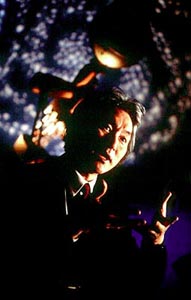![[Metroactive Movies]](/movies/gifs/movies468.gif)
[ Movies Index | Show Times | San Jose | Metroactive Central | Archives ]
Science Notes
High-level thinkers express their feelings in 'Me & Isaac Newton'
By Richard von Busack
APPARENTLY, director Michael Apted (who made the Seven Up series in the U.K., following a group of children from youth to middle age) has become influenced by Errol Morris. The documentary Me & Isaac Newton follows a group of scientists in fields ranging from oncology to zoology, asking them about their inner feelings about the work they've done. The film's smart and interesting--certainly, it would be an fine hour and a half on television, but it doesn't have the compelling cinematic qualities of Morris' similar Fast, Cheap and Out of Control. In Me & Isaac Newton, Apted dissolves in home movies, city scenes and views of the cosmos to illustrate the comments by the interviewees ("It's not clear that science can solve all mysteries"). The film is made well--and with good intentions. Yet the darting quality of the interviews keeps matters firmly on the surface, television-style.
The interviewees include theoretical physicist Michio Kiku, a true Einsteinian in both research and unassuming humanity. Kiku, who was interned in a Japanese-American detention camp as a child, built an atom-smasher in his garage and went on to UC-Berkeley. Today, Kiku is seen protesting the NASA plan to send up a spaceship loaded with radioactive material. The film also catches him at some impressive recreational ice skating (the solitude on the ice, Kiku says, helps him commune with Isaac Newton, which explains Apted's title). Kiku's dream is the one that eluded Einstein: the Unified Theory, "the equation, no more than an inch long," that would reconcile all of the universe's physical forces.
Grandmotherly Nobel laureate Gertrude B. Elion explains how the deaths by disease of two men close to her has helped keep her focused on a life-long goal of curing cancer--this despite the sexism that hampered her career. Patricia Wright is an ex-New York hippie who has the enviable job of studying lemurs on Madagascar. Wright was lured into biology through the adoption of a Peruvian owl monkey, bought at a pet store across the street from Max's Kansas City. Ashok Gadgil, an Indian researcher, discusses what's going to be the 21st century's most desperate problem: our water supply. Gadgil shows how he developed a scheme to purify drinking water with ultraviolet light; that problem solved, Gadgil faces the stickier problem of who will pay to build it.
These scientists are well aware of the frightening side of humanity's new powers. To those who fear the arrogance of science, this is a film about scientific humility. You have to believe Elion when she says, offhandedly, "The Novel Prize wasn't really the reward, the real reward is when someone tells me that I've saved their child's life." Maybe Elion deserves the last word: "If science doesn't save the world, what will?"
[ San Jose | Metroactive Central | Archives ]
![]()
 Watch the Skies: Physicist Michio Kiku protests a NASA proposal to send radioactive waste into space.
Watch the Skies: Physicist Michio Kiku protests a NASA proposal to send radioactive waste into space.
Me & Isaac Newton (Unrated; 108 min.), a documentary by Michael Apted, opens Friday at Camera 3 in San Jose.
From the December 7-13, 2000 issue of Metro, Silicon Valley's Weekly Newspaper.